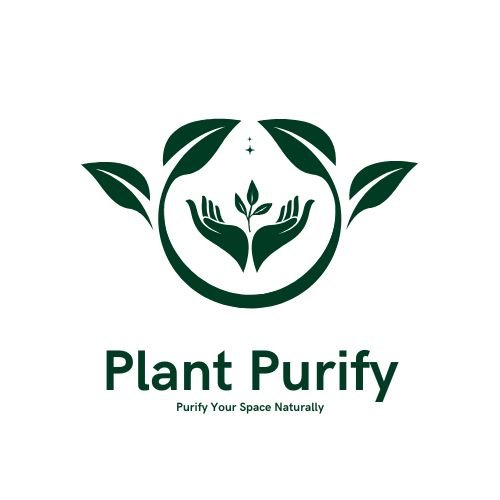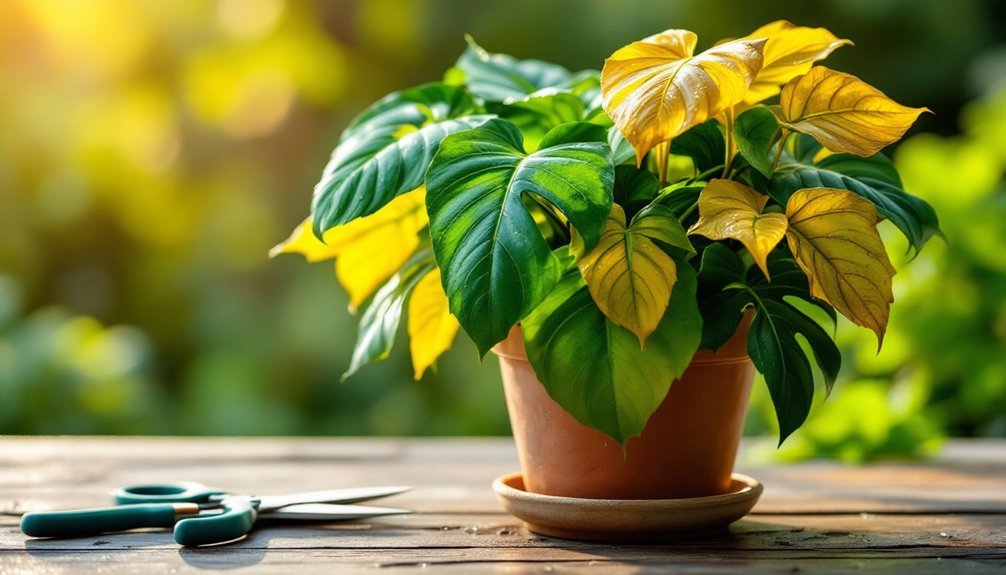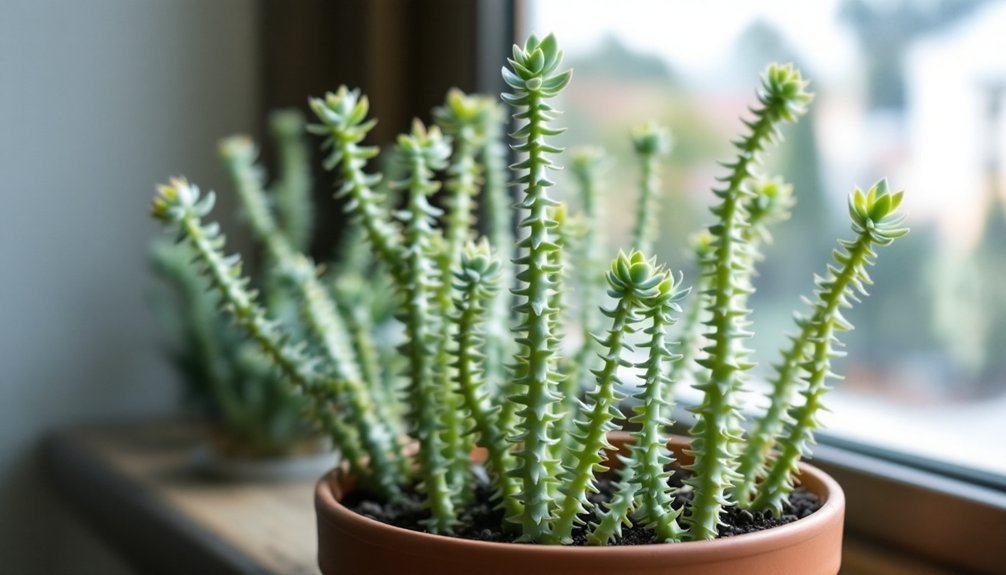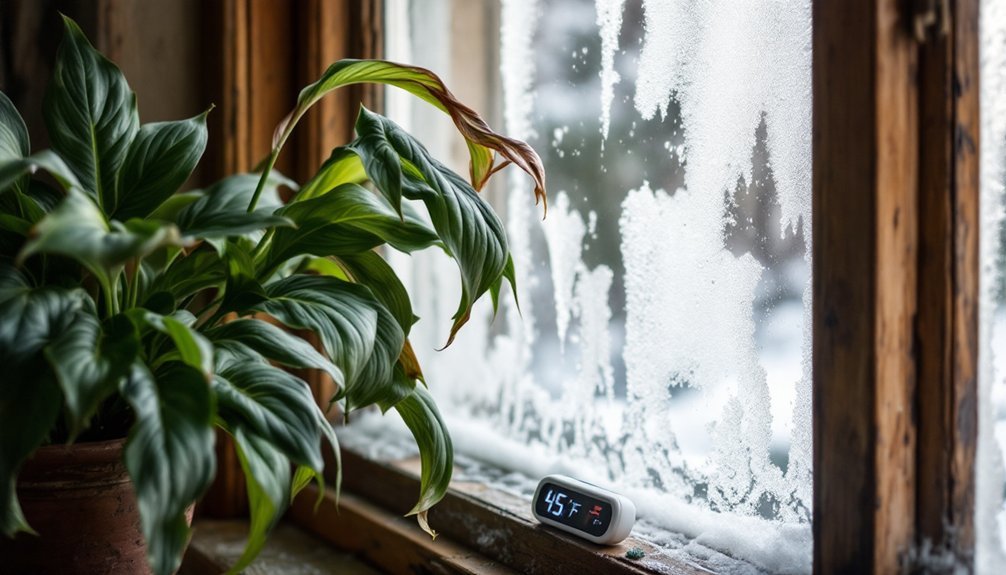Natural air-filtering plants offer you and your pets a safer way to purify indoor air compared to mechanical filters. Plants like Spider Plants and Boston Ferns remove up to 87% of harmful toxins without producing dangerous ozone or chemical emissions. They'll naturally increase humidity levels while operating silently and continuously, making breathing easier for your furry friends. The right placement and selection of non-toxic varieties can transform your home into a healthier environment. Discover which plants work best for your space and pets.
Understanding Plant-Based Air Filtration

While many pet owners rely on electronic air purifiers, nature offers an elegant solution through plant-based air filtration.
You'll find that certain houseplants act as natural filters, removing harmful toxins and improving indoor air quality for both you and your pets.
Plants like Spider Plants, Peace Lilies, and Boston Ferns are particularly effective air-purifying plants that are also non-toxic to pets.
Spider Plants, Peace Lilies, and Boston Ferns naturally purify indoor air while keeping your pets safe from toxic plant reactions.
These green guardians can reduce volatile organic compounds by up to 87%, creating a safer environment for your furry friends.
Through photosynthesis, they not only absorb pollutants but also release fresh oxygen into your home.
You can transform your living space by strategically placing these natural air filters throughout your home.
They'll work continuously to cleanse the air while adding beauty to your rooms.
Benefits of Natural Air Purifying Methods
Because natural air purification methods work around the clock, they offer distinct advantages over mechanical alternatives for pet owners.
You'll find that natural air filters, like spider plants and peace lilies, can remove up to 87% of indoor air pollution without using electricity or producing harmful ozone emissions.
These houseplants work silently to improve air quality while creating a safer environment for your pets.
They're particularly beneficial if your furry friends have respiratory issues, as the plants naturally increase humidity levels to help them breathe easier.
You won't need to worry about toxic emissions or high energy costs, making these living air purifiers an eco-friendly choice for your home.
Top Pet-Safe Air Filtering Plants

Five outstanding air-filtering plants offer both safety for your pets and superior air purification for your home.
You'll find spider plants and bamboo palms especially effective as natural air filters, as they're completely non-toxic to pets while removing indoor air pollutants like formaldehyde.
Boston ferns not only purify your air but also add beneficial humidity, making them perfect pet-safe choices for drier environments.
If you're looking for versatile air purification, consider the areca palm, which acts as both an air cleanser and natural humidifier.
While peace lilies excel at absorbing harmful chemicals like benzene and ammonia, you'll want to place them in areas your pets can't reach.
Each of these plants serves as an excellent choice for creating a healthier living space for both you and your pets.
Scientific Evidence Behind Plant Purification
Scientific research, including NASA's groundbreaking study, confirms that indoor plants actively filter harmful VOCs and airborne toxins through a natural process called phytoremediation.
You'll find compelling evidence that common houseplants like spider plants and peace lilies can remove up to 87% of air pollutants within 24 hours, making them highly effective natural air purifiers for your pets.
Through photosynthesis and root-system absorption, these plants break down harmful compounds like formaldehyde and benzene into harmless byproducts, creating cleaner air for your furry companions.
Plant Filtration Research Studies
While many people know that houseplants can beautify their homes, extensive research now confirms their powerful air-purifying abilities. NASA's groundbreaking studies in the 1980s revealed that common houseplants function as natural air filters, removing dangerous pollutants like benzene and formaldehyde from your indoor environment.
Recent findings from the University of Technology Sydney demonstrate that plants like pothos and snake plants effectively absorb harmful airborne toxins while remaining safe for pets.
You'll be impressed to learn that these plants can improve indoor air quality by reducing VOCs up to 70% within 24 hours.
What's more, research from 2019 shows that plant roots and their microorganisms work together to enhance air-cleaning efficiency.
These studies confirm that you're making a science-backed choice when using plants to purify your home's air.
Phytoremediation Process Explained
Understanding how plants naturally purify air through phytoremediation reveals a fascinating biological process that benefits both you and your pets.
Through this eco-friendly mechanism, plants actively absorb harmful pollutants from your indoor air quality and transform them into harmless substances.
The process works primarily through the plants' root systems, which act as natural filters. When you place air-purifying plants in your home, they'll remove up to 87% of airborne toxins within 24 hours.
Species like spider plants, peace lilies, and Boston ferns excel at this task, making them ideal choices for pet owners. These plants effectively capture volatile organic compounds (VOCs) and other contaminants, converting them through their natural metabolic processes.
The result is cleaner, healthier air that's safe for your entire household, including your furry companions.
Toxin Removal Effectiveness
Research-backed evidence confirms the remarkable effectiveness of indoor plants as natural air purifiers for your pets. NASA's groundbreaking study reveals that common houseplants can eliminate up to 87% of airborne pollutants within just 24 hours, demonstrating exceptional toxin removal effectiveness.
You'll find that specific plants excel at targeting harmful compounds that affect your pet's health. Spider plants and Peace Lilies actively filter VOCs, while Aloe Vera and Boston Ferns tackle formaldehyde and benzene.
This natural filtration system not only improves indoor air quality but also promotes beneficial microbial diversity in your home's environment.
The impact on pet health is significant – these plants create a cleaner breathing space that can reduce respiratory issues and allergies in your furry companions, making them an essential addition to any pet-friendly household.
Comparing Natural vs. Mechanical Filters
When considering air filtration options for your pets, natural and mechanical solutions offer distinct advantages and trade-offs.
Natural air filters, like houseplants, work silently to improve indoor air quality without creating stress-inducing noise or disruptive airflow that mechanical filters typically produce.
You'll find that natural air filters effectively combat airborne toxins such as formaldehyde and benzene while maintaining ideal humidity levels for your pets' well-being.
Unlike mechanical filters that need frequent replacements and maintenance, plants require minimal upkeep while continuously purifying your home's air.
They won't emit harmful substances like ozone, which some mechanical units produce.
When choosing between these options, consider how natural solutions can create a more peaceful environment for your pets while delivering consistent air purification benefits without the operational drawbacks of mechanical systems.
Optimal Plant Placement for Air Quality

Strategic placement of air-purifying plants can amplify their benefits for your pets while keeping them safe.
You'll want to position non-toxic plants near windows or bright areas to maximize their air-filtering capabilities through photosynthesis. For ideal placement, elevate your plants on shelves or tables to prevent pet accidents and guarantee proper airflow around the leaves.
Create clusters of plants in areas where your pets spend most of their time, like living rooms or near their beds, to enhance air quality where it matters most. This grouping technique creates a natural humidity boost and concentrates the air-purifying effects.
Strategically grouping pet-safe plants in your pets' favorite spots maximizes air purification while naturally boosting beneficial humidity levels.
Remember to choose pet-safe varieties like spider plants and Boston ferns, keeping any toxic species completely out of reach. Your pets will benefit from cleaner air while staying protected from harmful plants.
Maintaining Air-Purifying Plants With Pets
Maintaining air-purifying plants requires a careful balance between nurturing their growth and keeping your pets safe.
To create a healthy living environment, you'll need to select pet-safe plants and maintain them properly to maximize indoor air quality benefits.
Follow these essential maintenance steps:
- Monitor your plants' water needs carefully – overwatering can lead to mold growth that's harmful to both plants and pets.
- Position your air-purifying plants strategically, using hanging baskets or elevated surfaces to keep them out of your pet's reach.
- Choose proven pet-safe plants like spider plants, Boston ferns, and bamboo palms that effectively filter pollutants.
Regular maintenance guarantees your plants thrive while protecting your pets.
Common Indoor Pollutants Plants Remove

Modern homes harbor numerous invisible threats to your pet's health, from formaldehyde in household products to benzene released by synthetic materials. When your pets breathe these common indoor pollutants, they're exposed to potential respiratory health issues. Indoor plants act as natural filters, effectively removing harmful volatile organic compounds from your home's air.
| Pollutant | Source |
|---|---|
| Formaldehyde | Household Products |
| Benzene | Plastics & Synthetics |
| VOCs | Paints & Varnishes |
You'll find that plants like spider plants and peace lilies work tirelessly to improve air quality by absorbing these toxins. Research confirms that these natural air purifiers greatly reduce pollutant levels, creating a safer environment where your pets can breathe easier. By incorporating these plants into your home, you're actively protecting your pet's respiratory health.
Creating a Pet-Friendly Plant Environment
While choosing effective air-filtering plants matters, creating a safe environment for your pets requires careful planning. Your natural air filters can effectively remove harmful pollutants while keeping your furry friends protected.
You'll want to position pet-friendly plants strategically to maximize indoor air quality without risking your pet's safety.
To create an ideal environment, follow these key steps:
- Place air-filtering plants like spider plants and Boston ferns at elevated heights where pets can't easily access them.
- Group allergen-reducing plants such as bamboo palms in high-traffic areas where pets spend most time.
- Maintain proper spacing between plants to prevent pets from knocking them over while allowing adequate air circulation.
Remember to regularly monitor your plants for signs of damage and keep fallen leaves cleaned up to maintain both effectiveness and pet safety.
Frequently Asked Questions
Are Air Purifiers Safe Around Pets?
Yes, air purifiers are safe for your pets when used properly. They'll actually benefit from cleaner air, but you should choose HEPA filters, avoid ozone-emitting models, and keep cords secured to prevent accidents.
What Is the Best Air Purifier When You Have Pets?
You'll want a HEPA filter air purifier like the Black+Decker BAPUV350 or Coway Airmega 400S. They're excellent for pet homes, capturing dander and hair while removing odors through activated carbon filtration.
Why Are Air Purifiers Good for Cats?
Air purifiers help your cats by removing allergens, pet dander, and harmful particles from the air. They'll improve your cat's respiratory health, reduce odors, and create a cleaner environment for your feline friend.
How Often Should You Change Your Air Filter in Your House With Pets?
You'll need to change your home's air filter every 1-3 months if you have pets. For households with multiple pets or heavy shedders, check monthly and replace every 2-4 weeks for ideal air quality.
In Summary
Natural air filters offer you a safe, sustainable way to improve indoor air quality while keeping your pets healthy. You'll benefit from reduced pollutants, enhanced oxygen levels, and a more aesthetically pleasing home environment. By choosing pet-safe plants and positioning them strategically, you're creating a harmonious space where both your plants and pets can thrive. Remember to maintain your natural air filtration system properly for best results.





Leave a Reply